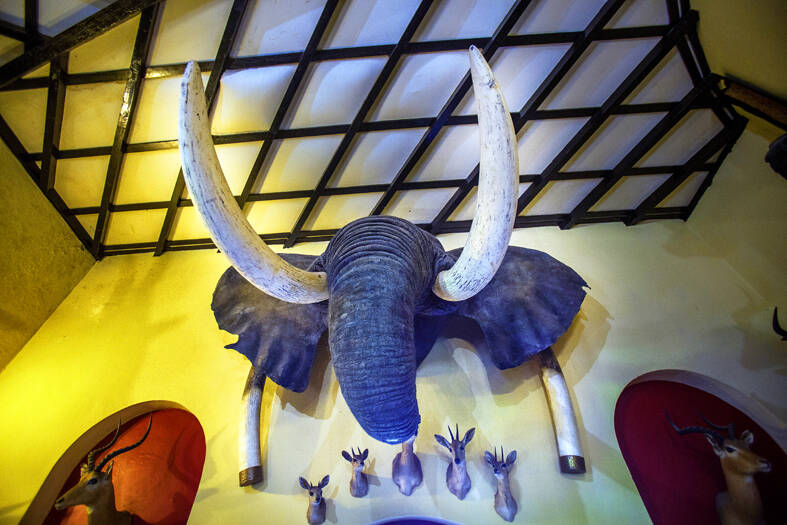More than one-fifth of the world’s migrating species are at risk of going extinct as a result of climate change and human encroachment, the UN’s first-ever report on migrating animals published yesterday said.
Billions of animals make journeys across deserts, plains or oceans every year to breed and feed, and “unsustainable” pressures put on migratory species could not only see their populations dwindle, but also disrupt food supplies and threaten livelihoods, the report said.
Of the 1,189 species covered by a 1979 UN Convention on the Conservation of Migratory Species of Wild Animals, 44 percent have seen numbers decline, and as many as 22 percent could vanish altogether, the report added.

Photo: AP
The numbers were based on assessments and data provided by the International Union for the Conservation of Nature as well as the Living Planet Index, which collates population numbers for more than 5,000 species from 1970 onward.
The report gives “a very clear direction” about what governments need to do to tackle the threats to migratory species, UN Convention on the Conservation of Migratory Species of Wild Animals executive secretary Amy Fraenkel said.
“It’s always about implementation,” she said ahead of the convention’s meeting in Samarkand, Uzbekistan.
The convention opened yesterday and is to run until Saturday.
Humans pose the biggest threat, with activities including hunting, fishing and other forms of overexploitation impacting 70 percent of the species on the UN list.
Habitat loss affected up to 75 percent of the species — underlining the need for more connectivity between isolated ecosystems.
The report’s authors urged governments to avoid disrupting habitats and migration paths when installing infrastructure such as dams, pipelines or wind turbines.
“We need to look at the top levels of government decisionmaking and what is being planned so that we can make sure that we can ... address human needs while not sacrificing the nature we all need to survive,” she said.
The pressures are being compounded by temperature changes, which disrupt the timing of migrations, cause heat stress and drive increasingly destructive weather-related events such as droughts or forest fires.
“The changes that had been already predicted some years ago are now happening,” Fraenkel said.
Parties to the convention meet every three years to review new species to add to its watchlist. Among the animals being considered at this week’s Samarkand meeting is the giant Amazon catfish.
The agency is also to launch a new program to provide technical assistance for countries to protect habitats more effectively, Fraenkel said.
Conservationists urged governments to honor their 2022 pledge under the new global biodiversity agreement to set aside 30 percent of the world’s land and sea territories for nature by 2030.
“If governments do everything they have committed to do, then the next [UN report] will have some good news,” said Susan Lieberman, vice president of international policy at the Wildlife Conservation Society, who is attending the Samarkand meeting.

When Shanghai-based designer Guo Qingshan posted a vacation photo on Valentine’s Day and captioned it “Puppy Mountain,” it became a sensation in China and even created a tourist destination. Guo had gone on a hike while visiting his hometown of Yichang in central China’s Hubei Province late last month. When reviewing the photographs, he saw something he had not noticed before: A mountain shaped like a dog’s head rested on the ground next to the Yangtze River, its snout perched at the water’s edge. “It was so magical and cute. I was so excited and happy when I discovered it,” Guo said.

Chinese authorities said they began live-fire exercises in the Gulf of Tonkin on Monday, only days after Vietnam announced a new line marking what it considers its territory in the body of water between the nations. The Chinese Maritime Safety Administration said the exercises would be focused on the Beibu Gulf area, closer to the Chinese side of the Gulf of Tonkin, and would run until tomorrow evening. It gave no further details, but the drills follow an announcement last week by Vietnam establishing a baseline used to calculate the width of its territorial waters in the Gulf of Tonkin. State-run Vietnam News

TURNAROUND: The Liberal Party had trailed the Conservatives by a wide margin, but that was before Trump threatened to make Canada the US’ 51st state Canada’s ruling Liberals, who a few weeks ago looked certain to lose an election this year, are mounting a major comeback amid the threat of US tariffs and are tied with their rival Conservatives, according to three new polls. An Ipsos survey released late on Tuesday showed that the left-leaning Liberals have 38 percent public support and the official opposition center-right Conservatives have 36 percent. The Liberals have overturned a 26-point deficit in six weeks, and run advertisements comparing the Conservative leader to Trump. The Conservative strategy had long been to attack unpopular Canadian Prime Minister Justin Trudeau, but last month he

Four decades after they were forced apart, US-raised Adamary Garcia and her birth mother on Saturday fell into each other’s arms at the airport in Santiago, Chile. Without speaking, they embraced tearfully: A rare reunification for one the thousands of Chileans taken from their mothers as babies and given up for adoption abroad. “The worst is over,” Edita Bizama, 64, said as she beheld her daughter for the first time since her birth 41 years ago. Garcia had flown to Santiago with four other women born in Chile and adopted in the US. Reports have estimated there were 20,000 such cases from 1950 to